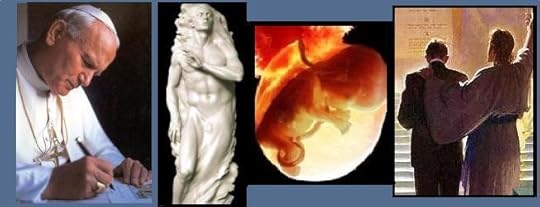Carl E. Olson's Blog, page 173
January 15, 2013
Vatican II and Religious Liberty
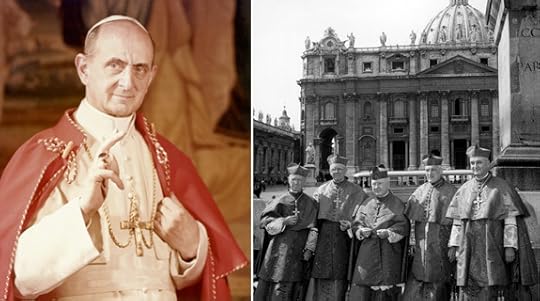
Vatican II and Religious Liberty | Omar F.A. Gutierrez | Catholic World Report
Dignitatis Humanae, the Council document on religious freedom, represented a development of Church teaching, not a reversal of it.
Of all the documents produced by the Second
Vatican Council, none had more revisions, saw more debate, or garnered more
controversy than the “Declaration on Religious Liberty” Dignitatis Humanae. This is in part because the document’s 15
tightly-packed paragraphs had the burden of boldly defending the rights of
conscience while at the same time respecting the teaching of the embattled
Church of the 19th century. This was no easy task, so we should be ever
grateful to the conciliar Fathers for the declaration as we face challenges to
our religious liberty today.
Change in doctrine?
The controversy stems from the accusation by both progressives and ultra-traditionalists that the
Council Fathers reversed earlier Church teaching. The
strange bed-fellows of Father Charles Curran and the late Archbishop Marcel
Lefebvre agree that the declaration is a break from doctrine and that it is a
break with significant consequences for the Church.
For Father Curran, who advocates for changes
in the Church’s teaching on contraception, homosexuality, pre-marital sex, and
divorce, the perceived break is a welcome example with which to argue for more
change. If the Church can totally reverse her teaching once, she can do it again.
For Archbishop Lefebvre, founder of the Society of St. Pius X, the break is a
betrayal. He went so far as to call the declaration outright apostasy and,
because of it, the Second Vatican Council a “robber council.” So his followers
today point to Dignitatis Humanae as
exhibit “A” in their dissent from the teachings of Vatican II.
Not everyone agreed with this assessment. The
great Dietrich von Hildebrand thought the declaration “marvelous,” and
indicated that it was overdue. He did not think it was a break from previous
teaching, but rather a natural consequence of the Gospel.
This was also the position of the drafters of the
document, the members of the Secretariat for Christian Unity. They wrote and
scrapped and rewrote version after version of the declaration in their conscientious
effort to proclaim the truth about the rights of conscience. They worked so
hard because a key aspect of Blessed Pope John XXIII’s vision was at stake.
The perception of the Church’s teaching by many
was that whenever she found herself in the minority, the Church would cry
religious liberty. However, if the Church was in the majority, the state would
be obliged to suppress other faiths. If that perception was not addressed,
argued the Secretariat, the desire of Blessed Pope John XXIII to make inroads
with non-Catholic Christians would be impossible.
This was a tension particularly acute in the
Catholic Church in America. Paul Blanchard’s 1949 anti-Catholic book American Freedom and Catholic Power
portrayed the Church as a menace to the US Constitution and real religious
freedom. Thus Father John Courtney Murray, Cardinal Richard Cushing of Boston,
Cardinal Francis Spellman of New York, and other American prelates agreed and
worked to advance the declaration at the Council.
The 19th century
An objective eye must admit that Dignitatis Humanae’s language does at
least appear to run counter to the language of the 19th-century popes.
January 14, 2013
"'Jesus of Nazareth' Completed" | by Fr. James V. Schall, SJ
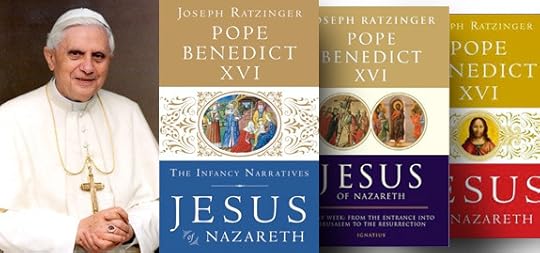
Jesus
of Nazareth
Completed | Fr. James V. Schall, S.J. | Sojourns with Schall | Catholic World Report
Benedict
XVI’s unique trilogy about Jesus Christ has, in a sense, bypassed the whole
world of academia by going right through it.
“Jesus’ teaching is not the product of
human learning, of whatever kind. It originated from immediate contact with the
Father, from ‘face-to-face’ dialogue—from the one who rests close to the
Father’s heart. It is the Son’s word. Without this inner grounding, his
teaching would be pure presumption.”
— Pope
Benedict XVI,
Jesus of Nazareth,
Volume I (New York: Doubleday, 2007), 7.
“The mystery, which has been hidden
through all ages and from all generations, is now revealed to us.”
— Post-Epiphany
Antiphon,
Breviary, Mid-morning Prayer.
“The two chapters of Matthew’s Gospel
devoted to the infancy narrative are not a meditation presented under the guise
of stories, but the converse. Matthew is recounting real history, theologically
thought through and interpreted. And thus he helps us to understand the mystery
of Jesus more deeply.”
— Pope
Benedict XVI,
Jesus
of Nazareth, Vol. III (New York: Image,
2012), 119.
With the
2012 publication of The
Infancy Narratives, the Holy Father’s account of Christ, Son of God and Son of
Man, is complete. The slim third volume of the trilogy covers the Gospel
accounts of the birth of Christ in Matthew and Luke. The Birth of Christ is
placed within the historical setting of His time, but also within the Jewish
background, as well as within the philosophical and cosmological significance
of what such a birth means. No one could grasp the full scope of the
incarnational event without averring to all the elements that serve to explain
the meaning of its reality.
Much of
the world is desperately trying to maintain that the evidence for the fact that
Christ is God incarnate in this world is not true or intelligible. This dogmatic
assumption of the “un-truth” of who Jesus is occurs in order to
justify its rejection of Him. This rationalization allows the world to live as
it wishes with a clear conscience, or so it thinks. It need not take seriously
the cogency of the truth of Christ’s claim. The pope calmly follows the
evidence and the reasoning. The fact is, as he shows, that Christ is who He
said He was.
In a
recent address to the International Theological Commission (December 7, 2012),
Benedict spoke of the “prejudice” that argues that “religions—and in particular
the monotheistic religions—are intrinsically vehicles of violence, especially
because they claim the existence of a universal truth. Some consider that this
‘polytheism of values’ alone would guarantee tolerance and civil peace and
would and would be in conformity with the spirit of pluralistic democratic
society.”
The net
effect of such a view, of course, necessarily means that religion cannot be
true and therefore has no place in any public order. This view usually leaves
the state in charge with no limit on itself caused by any truth or anything
outside its own control. To this self-enclosed view, Benedict responds that
“faith in the one God, Creator of heaven and earth, encounters the rational
needs for metaphysical reflection, which is not weakened but strengthened and
deepened by the Revelation of the mystery of the God-Trinity. …The form that
the definitive Revelation of the mystery of the one God assumes (lies) in the
life and death of Jesus Christ….”
Two things
are said here that cast light on the whole thesis of Jesus of Nazareth.
January 12, 2013
Church Fathers answer the question, "Why did Jesus insist on being baptized?"
Readings:
• Is 42:1-4, 6-7 or Is 40:1-5, 9-11
• Ps 29:1-2, 3-4, 3, 9-10 or Ps 104:1b-2, 3-4, 24-25, 27-28, 29-30
• Acts 10:34-38 or Or Ti 2:11-14; 3:4-7
• Lk 3:15-16, 21-22
If
baptism is necessary for the forgiveness of sins, why did Jesus insist on being
baptized by his cousin, John? And if baptism, as St. Peter wrote, “now saves
you … through the resurrection of Jesus Christ” (1 Pet 3:21), why would the
Messiah deem it appropriate, even necessary, to be baptized? What, was the
point of the Lord’s baptism in the Jordan River?
These and related questions fascinated and perplexed many of the early Church
fathers and theologians. The baptism of Christ, writes Fr. Kilian McDonnell,
O.S.B., in his study of the topic, The Baptism of Jesus in the Jordan: The
Trinitarian and Cosmic Order of Salvation (The Liturgical Press, 1996), “was widely discussed in all the currents
of theological reflection” in the early Church, “without doubt partly because
of the problems it posed.” From this discussion emerged many helpful
theological insights.
St. Justin Martyr (d. 165), one of the first great apologists, addressed the
baptism in his Dialogue with Trypho.
He emphasized that the Son had no need to be baptized—just as he had no need to
be born, to suffer, or die—but did so in order to reveal himself to mankind;
the baptism, in other words, was the messianic manifestation, a sign for the
Church first, and then the world. When Jesus came to the waters, St. Justin
wrote, “He was deemed a carpenter,” but the proclamation of the Father and the
descent of the Holy Spirit in the form of a dove showed him to be far more than
a mere worker of wood.
In his famous work, Against Heresies, St. Irenaeus (d. c. 202) focused on the participation of those who
believe in Christ in the anointing of the Savior. The connection between the
baptism and anointing—itself an essential Messianic concept—is already evident
in the New Testament, as heard in today’s reading from the Acts of the
Apostles: “…how God anointed Jesus of Nazareth with the Holy Spirit and power.”
This same anointing, St. Irenaeus wrote, is given to those who are baptized
into Christ. The Holy Spirit, having descended upon the Son, has become “accustomed
in fellowship with Him to dwell in the human race, to rest with human beings,
and to dwell in the workmanship of God, working the will of the Father in them,
and renewing them from their old habits into the newness of Christ.”
Others
delved into the mystery and meaning of the Jordan River, which was already, at
the time of Christ, the site of many key events in the history of Israel. St.
Hippolytus (d. c. 236) referred to “the Grand Jordan”; Origen (d. 254) wrote
that just as “no one is good, except the one only God, the Father,” likewise
“no river is good except the Jordan.” St. Gregory of Nyssa (d. c. 394), in his
treatise, On the Baptism of Jesus,
wrote, “For Jordan alone of rivers, receiving in itself the first-fruits of
sanctification and benediction, conveyed in its channel to the whole world, as
it were from some fount in the type afforded by itself, the grace of Baptism.”
Just as Joshua had entered the Promised Land by crossing the Jordan, Jesus
opened the way to heaven by entering and dividing the same waters.
St.
Ephrem (d. 373) wrote a beautiful hymn in which he connected the baptism of
Jesus with the womb of Mary and the sacrament of the Eucharist: “See, Fire and
Spirit in the womb that bore you! See, Fire and Spirit in the river where you
were baptized! Fire and Spirit in our Baptism; in the Bread and the Cup, Fire
and Holy Spirit!” Christ, the Light of the World, dwelt first in the womb of
the Virgin—who was thus “baptized” by her Son—and then in the womb of the
Jordan; he emerged from both as the Incarnate Word, the Savior of mankind.
Those who are baptized thus become the children of Mary and partakers of the
body, blood, soul, and divinity of her Son.
(This "Opening the Word" column originally appeared in the January
10, 2010, edition of Our Sunday Visitor newspaper.)
January 11, 2013
The Professor Who Knows Our Names
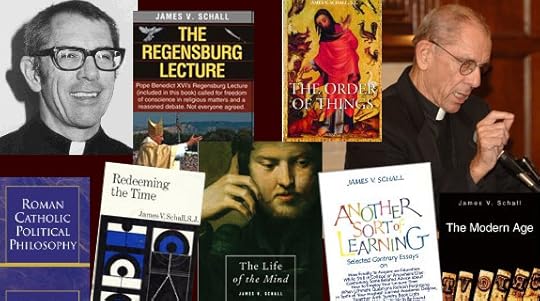
The Professor Who Knows Our Names | Brian Jones | Catholic World Report
A tribute to the man who is Schall
“Father Schall cares
about where you’re from and how you’re doing. He doesn’t need to do that, but
he does. The greatest professor I’ll ever
have knows my name.”
— Victoria Edel, former
student of Father James Schall
“What, in the end, does a
professor most want his students to remember? Not himself but what is true and
the search for it. Above all, he wants them to remember the Socratic
foundations of our culture, that ‘it is never right to do wrong,’ that death is
not the worst evil, that ultimately our lives are about eternal life, as
Benedict XVI writes in his great encyclical on modernity, Spe Salvi. The university is a place where truth, all truth, can be
spoken, ought to be spoken. Often it is not. It is imperative, as Schumacher
said, that a student knows where to turn when it is not.”
— Father James V. Schall, SJ,
“The Final Gladness,” December 7, 2012.
I once took a philosophy
course in which, at the end of the semester, the professor told us a story about
whether or not there was such a thing as a “stupid question.” He said that
toward the close of a recent semester at a university in Bulgaria, a young and
tepid student raised her hand and asked, “Professor, is there such a thing as a
stupid question?” Hoping to relieve the young student of her fear and worry, he
quickly shot back, “Of course not. If you have any questions in this class, I
want you to come right out and ask them with no worry of rebuke or concern that
your question is not worth asking.” The girl breathed a sigh of relief, and
then proceeded to ask her question: “Professor, how come you don’t know any of
our names?” The professor, with his smile turning to stone, simply responded,
“I guess I was wrong: that is a stupid question.”
The point of my telling
this story as the introduction for a tribute to Father James Schall will hopefully become apparent.
To even attempt to write something in honor of such a man, who the Georgetown
University student newspaper calls a “living legend,” will surely fall
enormously short of the true pietas that
we, as his students, owe to him. Last month, Father Schall gave his last public lecture at
Georgetown University, a place that he has been able to call home for the last
34 years. Of course, Father Schall would be quick to remind us, along with
Chesterton, that even at home, he still has a sense of being “homesick.” Even
in the greatest of places, surrounded with the joy of family and friendship,
this life nevertheless leaves us unsettled. We are still restless, since even
the good things of this life are simply a prelude to what is to come, whereby
the fulfillment of all our desires and pursuits will come to rest in Him who is
our end. It is all the more poignant, then, that Father Schall titled his last lecture, “The Final
Gladness.” And what precisely is this “final gladness”? Schall tells us that it
will ultimately consist “in a meeting in which we, in friendship, at last find
ourselves seeing God as we would have it, face-to-face.”
Schall has bequeathed to
us a plethora of writings wherein he has explored practically every topic in
human affairs.
January 10, 2013
Tardy Reflections on the Election
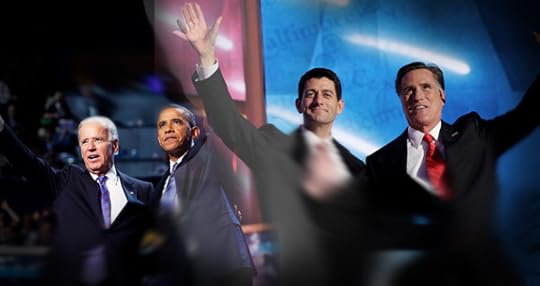
Tardy Reflections on the Election | James Kalb | Ecclesia et Civitas | Catholic World Report
The November 2012 elections revealed that the Republicans believe in nothing, while the Democrats believe in Nothing.
A great
many things might have changed the results in November. Hurricane Sandy might have
headed into the Atlantic instead of the Atlantic states. Or moods might have
shifted, so that memes like “the war against women” might have flopped rather
than flown.
Still,
there’s no explaining away what happened, and the re-election of Barack Obama,
a pure representative of the media-bureaucratic complex and the intolerant
social leftism it stands for, must show something. He may have won because the
Republicans failed to come up with an appealing candidate and message, and not
because the majority was smitten with his social views, but that failure must
show something as well.
Many
people have the sense that the election revealed a basic change in American
life. What it shows is the extent to which advanced liberalism has become our
established faith. It’s the one our most influential authorities accept and
rely on, and they feel called upon to import its principles into all aspects of
life. That’s why abortion is the law of the land and voters aren’t allowed to
say otherwise. The election returns showed that they have grown used to that
situation, and no longer find it seriously objectionable.
If
that’s what the election showed, then it had to do with fundamental tendencies.
On that point, it revealed that the Republicans believe in nothing, while the
Democrats believe in Nothing.
To
believe in nothing is to have no beliefs except success. Individual Republicans
may be decent public-spirited people, and they are likely to believe on some
level in other things, the role of marriage as a distinct fundamental
institution, for example. The point though is that for the national party such
issues aren’t taken seriously. They function as campaign slogans for particular
audiences. What’s taken seriously is American power abroad, economic success at
home, and victory for Republicans. That’s what the party, as a party, believes
in.
Power
and success are not bad things. Power is the ability to achieve goals, and
success is actually bringing them about. Both are good as a general rule, and
politicians should favor them, but they’re not enough for a political outlook
that makes sense. Something more is needed to tell us what to aim for and what
to do with it when achieved. The Republicans have nothing that serves that
purpose.
The
Democrats do: they have Nothing.
John Paul II’s “Triptych” of the Human Person
John Paul II’s “Triptych” of the Human Person | Charles Dern | Homiletic & Pastoral Review
An introduction to the first part of Pope John Paul II’s Theology of the Body.
We have good news! The rich teaching of John Paul II’s Theology of
the Body (TOB) is beginning to filter into seminaries, undergraduate
theology courses, and into specialized seminars. But
despite this good news, many of today’s priests, deacons, and religious
likely were educated before the insights from the TOB were integrated
into various seminary and monastic programs. Adding to this problem is
that the TOB was originally delivered as a series of talks, with its
style complicating and confounding what the late Pontiff was trying to
communicate. This problem is unfortunate (but not insurmountable)
because his Theology of the Body is essentially a series of reflections
on scripture passages, many of which appear in the regular Sunday
reading cycles. Given that most lay adults receive what precious little
instruction they do through Sunday homilies, they may be missing out on
some very profound insights that counteract utilitarian views of the
person, and misunderstandings of marriage, that so pervade contemporary
society.
John Paul II began his work for the Theology of the Body in the early
1970s as a book project when he was still Cardinal Karol Wojtyła. As an
academic philosopher, Wojtyła concerned himself in particular with the
philosophical question of what it means to be a human person. In
addition to a number of articles, Wojtyła published two books on this
subject. His earlier work, Love and Responsibility (1960),
examines the nature of human love—and by implication, Divine Love—and
concludes that love’s very essence includes both communion (gift of self
to the other, such as occurs in the Trinity)—and creativity (an
outpouring of something new from the communion, such as God’s outpouring
of Love in creation). 1
In response to the dualistic vision of the person (separation of mind
and body) spawned primarily by Rene Descartes, Wojtyła’s second book, The Acting Person (1969), argues that persons act as an integrated, unified being. 2
This article focuses on the first part of his Theology of the Body
which, “takes a step back” as it were, and broadens the vision of
humanity from not just this life (historical man), but to what God
intended for man before the Fall (original man), as well as what God has
in store for those who love Him (eschatological man). The three
reflections are likened to a “Triptych” or three-panel painting in which
all three sections are required to see the whole picture. This stands
in contrast to the sciences that tend to analyze the person only in a
single dimension (e.g., biology), and contemporary philosophies, that
look at this life only (e.g., existentialism). These approaches offer
what John Paul II calls an “inadequate anthropology” of the human
person.
It isn't rare, it isn't safe, but, c'mon, it's legal!
In the hit song, "Two Out of Three Ain't Bad" (#11 in 1977, if you're keeping track at home), Meat Loaf sang the following:
I want you (I want you)
I need you (I need you)
But-there ain't no way I'm ever gonna love you
Now don't be sad (Don't be sad)
'Cause two out of three ain't bad
Now don't be sad
We hear, repeatedly, that the happy, benevolent citizens of Pro-Choice Nation aren't really pro-abortion (remember Sen. Obama's statement of the same?), but actually want abortions to be "safe, legal, and rare". Right. Perhaps Meat Loaf can cut a new tune titled, "One Out of Three Ain't Bad", as more stories come out about women dying or being seriously injured during abortions, not to mention the vile, disgusting conditions found in many abortion mills—as if anyone should be surprised that a facility dedicated to killing the unborn would be vile and disgusting.
And then there are the recently released numbers from Planned Parenthood (courtesy of The Washington Times):
January 9, 2013
Pope focuses catechesis on the meaning of "Incarnation"
From Vatican Information Service:
Vatican
City, 9 January 2013
(VIS) - Benedict XVI dedicated his Wednesday catechesis during
today's general audience to the meaning of the word Incarnation, "a
term," the Pope said, "that has resounded many times in our
Churches over these past days, expressing the reality that we
celebrate at Christmas: the Son of God become man, as we say in the
Creed."
The
Holy Father began by explaining the meaning of this word, which is
central to the Christian faith, starting from the Church Fathers,
especially St. Ignatius of Antioch and St. Irenaeus, who used it when
"reflecting on the Prologue of St. John's Gospel, particularly
in the expression, 'the Word became flesh'. Here the word 'flesh',"
the Pope emphasized, "refers to the person in their entirety,
precisely in light of their transcience and temporality, their
poverty and contingency. This tells us that the salvation wrought by
God made flesh in Jesus of Nazareth reaches the human person in their
concrete reality and in whatever situation they may find themselves.
God took on the human condition in order to heal it of everything
that separates it from Him, in order to allow us to call Him, in his
Only Begotten Son, by the name of 'Abba, Father', and to truly be
children of God."
Then
the Pope recalled the Christmas tradition of exchanging gifts with
those closest to us. Sometimes this may be a gesture undertaken out
of convention but, generally, it "expresses affection. It is a
sign of love and esteem." This same idea of giving is at the
heart of the liturgy of these feastdays and "it reminds us of
the original gift of Christmas. On that holy night, God, becoming
man, wanted to make himself a gift for humanity ... he took on our
humanity in order to give us His divinity. This is the great gift.
... In this we find the model of our giving because our
relationships, especially those which are most important, are guided
by generosity and love."
The
fact of the Incarnation, of God who makes himself man like us, shows
us "the unprecedented reality of divine love. God's action, in
fact, is not limited to words. Rather, we can say that He is not
satisfied with speaking but immerses himself in our history and takes
upon himself the worry and the weight of human life. ... God's way of
acting is a strong stimulus for us to ask ourselves about the reality
of our faith, which should not be limited to the arena of feeling, of
the emotions, but must enter into the concrete reality of our
existence, must touch, that is, our everyday life and orient it in a
practical way. ... Faith has a fundamental aspect that affects not
only our mind and our heart but all of our life."
Citing
the Church Fathers again, the Pope observed that on numerous
occasions Jesus was compared with Adam, even to the point of calling
Him the "second Adam", or the definitive Adam, the perfect
image of God. With the Incarnation of the Son of God a new creation
occurs, which gives a complete answer to the question 'who is man?'
... Only in Jesus is God's plan for human being fully revealed: He is
the definitive man according to God."
"It
is important, therefore, that we rediscover our wonder at this
mystery, that we let ourselves be enveloped by the grandeur of this
event: God walked our paths as man. He entered into human history to
give us His very life. And he did this not with the splendour of a
sovereign, subjugating the world with his power, but with the
humility of a child."
"In
that child, the Son of God whom we contemplate at Christmastime,"
Benedict XVI concluded, "we can recognize the true face of the
human being, and only in opening ourselves to the action of His grace
and seeking every day to follow Him do we carry out God's plan for
us."
20% off New and Recently Released Books and DVDs
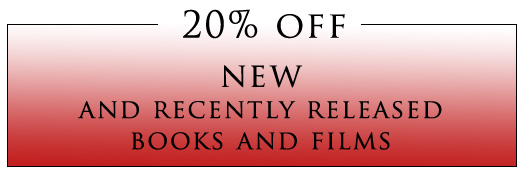
20% off New and Recently Released Books and DVDs
Offer ends Tuesday January 15th, 2013 at 12:00 midnight EST.
These prices are available online only through Ignatius.com
Inspiring
new and recently released books and films are now available at a
special discount! James Hitchcock provides a knowledgeable,
comprehensive look at the history of the Catholic Church in his new book
appropriately titled History of the Catholic Church, deepen your relationship with God by delving into Frank Sheed's classic work, Knowing God,
and delve into the intriguing mysteries connected with the stories and
history of famous Catholic saints, apparitions, Popes, and holy places
in the new film Religious Mysteries. Get these and more great titles at 20% off!
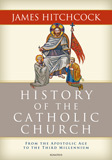 History of the Catholic Church
History of the Catholic Church
James Hitchcock
The history of the Catholic Church is long, complicated, and
fascinating, and in this book it is expertly and ably told by historian
James Hitchcock. This ambitious work is comprehensive in its scope and
in incisive in its understanding, a valuable addition to any school or
home library. Also available as an e-book.
Regular price: $29.95, sale price: $23.96
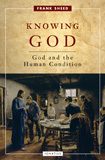 Knowing God
Knowing God
Frank Sheed
In Knowing God the great Catholic writer, teacher, and
publisher Frank Sheed helps readers to know that God exists, to think
about who and what God is, and to know God personally. He clears away
popular misunderstandings of God, often held by otherwise knowledgeable
people. Also available as an e-book.
Regular price: $17.95, sale price: $14.36
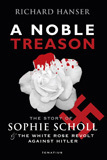 A Noble Treason
A Noble Treason
Richard Hanser
A Noble Treason tells the true story of the underground
group, The White Rose, at the University of Munich that instigated,
organized, and carried out the first overt resistance to Hitler's
regime. What gives A Noble Treason its unforgettable and inspiring quality is the personality, character, and courage of the White Rose members. Also available as an e-book.
Regular price: $17.95, sale price: $14.36
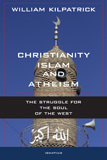 Christianity, Islam and Atheism
Christianity, Islam and Atheism
William Kilpatrick
Christianity, Islam, and Atheism argues that Islam is a
religion of conquest and subjugation and that in spite of 9 /11 and
thousands of other terrorist attacks throughout the world, many in the
West still do not know or admit this because it conflicts with their
multiculturalism and their belief in the equivalence of all cultures and
religions. William Kilpatrick also exposes the role played by atheists
and secularists in advancing Islam. Also available as an e-book.
Regular price: $24.95, sale price: $19.96
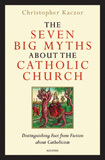 The Seven Big Myths about the Catholic Church
The Seven Big Myths about the Catholic Church
Christopher Kaczor
The Roman Catholic Church has long been the target of suspicion
and hostility. But how much of this is based on ignorance and prejudice
and how much is the fruit of thoughtful consideration of the facts? This
book separates fact from fiction. Without excusing or justifying
wrongdoing, author Christopher Kaczor clarifies official Catholic
teaching and demonstrates that much popular opinion about Catholicism is
based on misunderstanding and misinformation. Also available as an e-book.
Regular price: $17.95, sale price: $14.36
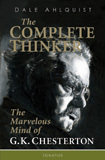 The Complete Thinker
The Complete Thinker
Dale Ahlquist
What does it mean to be a "complete thinker"? It means being able
to take on a wide variety of ideas and disciplines and put them all
together in a way that they work together. It means thinking like G.K.
Chesterton. Chesterton's thoughts on almost everything-from east to
west, from old to new, from politics to economics, from Shakespeare to
Dickens-are woven together to create an illuminating whole. Also available as an e-book.
Regular price: $17.95, sale price: $14.36
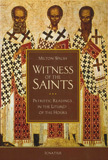 Witness of the Saints
Witness of the Saints
Milton Walsh
In the four volumes of the Liturgy of the Hours, the official daily
prayer of the Catholic Church, there are nearly 600 selections from the
writings of Fathers and saints. Seeing the potential of this vast
collection as a theological resource, Milton Walsh has organized these
selections by topics according to the four pillars of the Catechism of the Catholic Church. Also available as an e-book.
Regular price: $34.95, sale price: $27.96
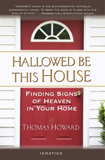 Hallowed Be This House
Hallowed Be This House
Thomas Howard
Thomas Howard shows us that every room of your house-the living
room, the kitchen, the bedroom, and even the bathroom-is a holy place
where God's grace awaits you, if only you know how to recognize His
presence there. Also available as an e-book.
Regular price: $14.95, sale price: $11.96
Films
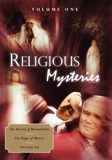 Religious Mysteries Volume One
Religious Mysteries Volume One
This new documentary film series presents investigations into
intriguing mysteries connected with the stories and history of famous
Catholic saints, apparitions, Popes, and holy places, and some amazing
findings from these studies. This DVD includes three separate films: The
Secret of Bernadette, The Pope of Mercy, and The Lost Ark.
Regular price: $24.95, sale price: $19.96
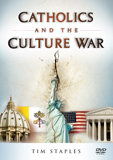 Catholics and the Culture of War
Catholics and the Culture of War
Catholic apologist and radio host Tim Staples demonstrates how
several minor "battles" over the last 65 years have led to us to where
we are now... in a full-fledged war between two very different schools
of thought when it comes to what society says is right... or wrong. It's
a vivid look at what America used to be like-and how dramatically we
have changed. The good news is that we can turn this situation around.
We can regain lost ground. We can win the battle for our culture.
Regular price: $19.95, sale price: $15.96
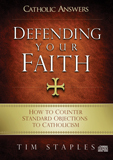 Defending Your Faith
Defending Your Faith
Catholic Answers' Director of Apologetics, Tim Staples, presents
some of the most common challenges to Catholicism, and gives you solid,
Biblically-based answers that you can use to refute them. Along with the
scriptural evidence, Staples also explains the beautifully rational
arguments which make these same teachings come alive in our hearts and
minds.
Regular price: $19.95, sale price: $15.96
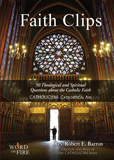 Faith Clips
Faith Clips
Join popular Catholic teacher Fr. Robert Barron as he answers 50
frequently asked questions about the Catholic faith on a diverse range
of topics-from God, Jesus and the Trinity to the sacraments, prayer and
the spiritual life. Faith Clips is an interactive tool for anyone who seeks to learn or present basic theological and spiritual precepts.
Regular price: $19.95, sale price: $15.96
 Romance without Regret
Romance without Regret
Whether you are in a relationship, looking for love, or just trying
to understand God's plan for properly using the gift of sexuality he
has given to you, Romance Without Regret will hand you the tools you need in order to know the difference between love and lust.
Regular price: $19.95, sale price: $15.96
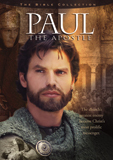 Paul the Apostle
Paul the Apostle
From the Emmy award-winning director Roger Young comes the
spectacular story of Paul the Apostle. This augmented adaptation,
largely based on the biblical account, profiles Christ's most prolific
messenger. Paul, originally known as Saul of Tarsus, was at the
forefront of efforts to stamp out the early church until Jesus stopped
him on the road to Damascus, forever changing his life and mission.
Regular price: $16.95, sale price: $13.56
 Hardflip
Hardflip
This movie follows the story of Caleb, a young skater whose ill
mother and absent father leave him reaching for the only hope he has...
becoming a sponsored skater. After finding a stack of old love letters,
he sets out to find the father he never knew and inadvertently begins a
journey he never could have expected.
Regular price: $19.95, sale price: $15.96
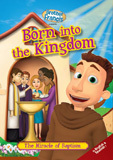 Born into the Kingdom
Born into the Kingdom
In this happy presentation, Brother Francis invites us to share in
the realities of the Sacrament of Baptism and the union it provides us
with God's big family! Filled with instruction and inspiration, Born into the Kingdom is a great reminder of God's wonderful grace!
Regular price: $12.99, sale price: $10.39
Catholic World Report
The Best Books I Read in 2012
by 35 authors, editors, and contributors

Another year, another tantalizing list of good and great books noted
and recommended in this eighth edition of "Best Books I Read..." We've
invited a wide range of authors and editors to contribute. The books
chosen did not have to be published in 2012, nor did they have to be
about a specific topic. Simply, "What were the best books you read in
the past year?" No limit was set on the number of books, and commentary
was optional.
Homiletic & Pastoral Review
Social Justice According to Pius XI
by Thomas Storck
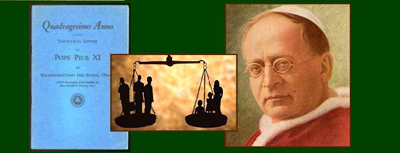
The term “social justice,” though common enough today, is little
understood by most of those who use it—whether they consider themselves
friends and practitioners of social justice, or they regard it as a
suspect term of probably socialist origin. But the term does have a
precise meaning. That meaning and the significance of this concept of
justice, were carefully explained by Pius XI, the pontiff who introduced
it into the corpus of Catholic social teaching. In many respects it is
the key term and concept of Catholic social teaching. All the
other aspects of the Church’s social doctrine—such as the principle of
subsidiarity, the just wage or the right to private property—are related
to social justice, and rely on the existence of social justice. Pope
Pius, who reigned from 1922 to 1939, introduced the term into Catholic
teaching in his encyclical, Studiorum Ducem (1923). He later made extensive use of it in two important social encyclicals: Quadragesimo Anno (1931) and Divini Redemptoris
(1937). But, before taking a close look at the exact meaning of social
justice, let us try to clear away some confusions over justice itself,
especially as contrasted with charity.
For Additional Sale Items Click HERE!
Items are not sold on approval.
Periodically we make available -- only to you, our valued repeat
customers -- special offers which are not available to the general
public. We offer these discounted prices as our gift to those who help
us by using Ignatius.com. Please do not ask for retroactive price
consideration. We cannot accommodate those requests. Many thanks.
January 8, 2013
Challenging Young People to Live the Faith

Challenging Young People to Live the Faith | Jim Graves | Catholic World Report
Youth ministry programs at the diocesan and national levels change the hearts and minds of countless young people.
At
World Youth Day 2011 in Madrid, Spain, Pope Benedict XVI addressed more than a
million young people who had traveled from countries across the globe to
participate in the event. Referencing Christ’s command in Mark 16:15, “Go into all the world and proclaim the
Gospel to the whole creation,” the Holy Father said, “You too have been given
the extraordinary task of being disciples and missionaries of Christ in other
lands and countries filled with young people who are looking for something
greater and, because their heart tells them that more authentic values do
exist, they do not let themselves be seduced by the empty promises of a
lifestyle which has no room for God.”
The decades after Vatican II saw
many young people leave the active practice of the Faith, often to the distress
of their parents. A variety of factors are often cited for this exodus,
including the lure of materialism, relativism, and the sexual revolution, poor
catechetical programs and formation, and the influence of non-Catholic
religions in search of converts.
Today, lay Catholic youth
ministers are on the front lines, winning teens back to the Church. Their role
is often to provide an initial outreach to teens, getting them excited about
the Faith and steering them back to regular involvement in their local
parishes. While battling cultural messages that are the antithesis of Catholic
teaching can be a daunting challenge, youth ministers are reporting that
progress is being made in winning back young people, one soul at a time.
Diocesan
programs
Gary Foote, coordinator of youth ministry
for St. Edward Church in Dana Point, California, has worked in youth ministry
for 14 years.
Carl E. Olson's Blog
- Carl E. Olson's profile
- 20 followers


